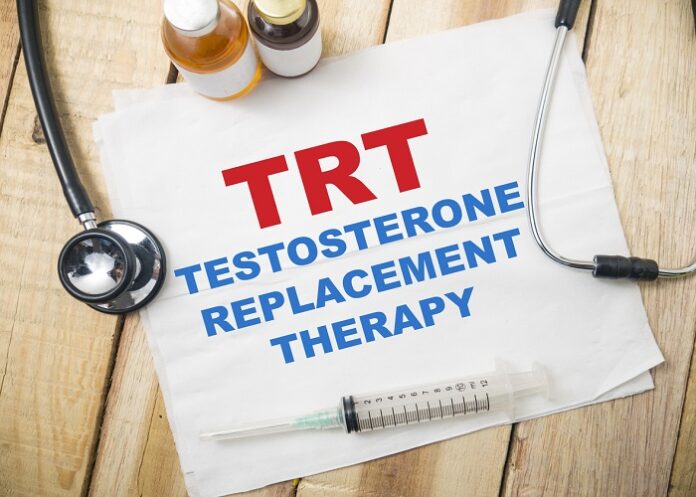The prescribing of testosterone for middle-aged women is “out of control” and may have long-term implications for their health, warn experts, amid concerns over advice from social media “evangelists”.
They say these “evangelists” – including some celebrities and GPs – are giving women the impression that the hormone will reduce fatigue and improve their energy levels, and also protect their heart, brain, muscles and bones.
But the evidence only supports testosterone’s use in postmenopausal women with low libido, when psychosocial causes have been ruled out.
“I genuinely think testosterone prescribing is completely out of control in the UK,” said Dr Paula Briggs, a consultant in sexual and reproductive health at Liverpool Women’s hospital and chair of the British Menopause Society.
“People are being led to believe that they must have this. But we have no idea what long-term testosterone supplementation does to women.”
Despite its reputation as a male hormone, testosterone is also produced in the ovaries and female adrenal glands, and plays an essential role in the development and maintenance of female sexual anatomy, physiology and sexual response, reports The Guardian.
Levels usually peak in a woman’s 20s and 30s, then gradually start to decline – probably due to waning production by the ovaries and adrenal glands, although stress, surgical removal of the ovaries, and certain drug or cancer treatments can also suppress its production.
In the UK, National Institute for Health and Care Excellence (NICE) guidelines on menopause diagnosis and management say doctors can consider testosterone supplementation for menopausal women with low sexual desire if conventional oestrogen and progesterone-based hormone replacement therapy alone is not effective.
According to British Menopause Society guidelines, this should only be considered once other causes, such as psychological or relationship issues, or medications, have been excluded. Even so, some private doctors are understood to be prescribing it as a first-line treatment for libido problems and other symptoms.
For instance, in a recent Instagram live broadcast, Dr Louise Newson, a GP who runs a network of private menopause practices in the UK, claimed it was “barbaric and wrong that women aren’t able to access their own hormone” and that testosterone could “improve mood, energy, concentration, stamina, as well as improve bone density and the way our muscles and cardiovascular systems work”.
While many clinicians start HRT first and then add in testosterone, “increasingly I see women who are peri-menopausal, their periods are still regular, and the majority of their symptoms seem to be related to testosterone deficiency (rather) than oestrogen deficiency”, Newson said. “For those women I might start only a very low dose of HRT and start testosterone in the first consultation.”
She added that testosterone has a significant influence on brain processing and function so clinicians should stop thinking about it purely as a hormone to improve libido.
Professor Susan Davis, head of the Monash University Women’s Health Research Programme in Melbourne, Australia, and a past president of the Australasian Menopause Society and the International Menopause Society, said: “The data clearly support a trial of therapy in postmenopausal women with low sexual function that bothers them.
“But we have looked at the evidence inside and out, reviewed all published literature, and published all of our own data. The evidence that testosterone will improve fatigue, well-being, cognition, or anything else you want to list, is just not there.”
Briggs’ biggest concern is that women will accidentally end up with excessively high or “supra-physiological” levels of testosterone in their bodies, because of their hormone levels not being closely monitored.
“I’ve heard doctors saying it doesn’t matter if they are outside the normal range if the patient isn’t experiencing side-effects, but we don’t know what’s happening within their arterial system or even their heart,” she says.
“Men who use high-dose testosterone [to build muscle] in gyms get cardiomyopathy – where the muscle in the heart becomes weak and can’t pump – and some of them die, so it’s not nothing.”
Professor Annice Mukherjee, a consultant endocrinologist at Spire Manchester Hospital, and a media ambassador for the Society for Endocrinology, said she had seen patients with unpleasant side effects after being prescribed testosterone.
“Women come to me saying: ‘My hair’s falling out’ or ‘My voice has got deeper, and I’ve got new acne or hair growth on my body, why is that?’ So, I measure their testosterone, and it is sometimes equivalent to a man’s level,” she said.
One of her patients was a professional singer, who had been prescribed testosterone by a private clinic. “Her doctor had said: ‘You need HRT, and by the way, you also need testosterone.’ She came to me because she was experiencing problems with her voice. When I tested her testosterone levels, they were more than double what is normal for a woman.
“If we give women too much testosterone, it can affect their vocal cords. If you don’t mind your voice deepening a bit, that’s fine, but if you’re a singer, it can change your pitch.”
Briggs and Dr Stephanie Faubion, medical director of the North American Menopause Society and director of the Mayo Clinic’s Women’s Health Research Centre in the US, are also concerned about the lack of long-term safety data for testosterone use in women.
“There’s a reason that we should be concerned about long-term safety, and that’s because we don’t have any data to say that it is safe,” said Faubion. “We don’t have data to say that it’s unsafe either. But the lack of data proving safety is a real problem.”
See more from MedicalBrief archives:
Post-menopause testosterone patch in the pipeline
Hormone therapy for menopause symptoms: two decades on, the fear of risks persist
Women see GP 10 times before menopause diagnosis – UK expert

